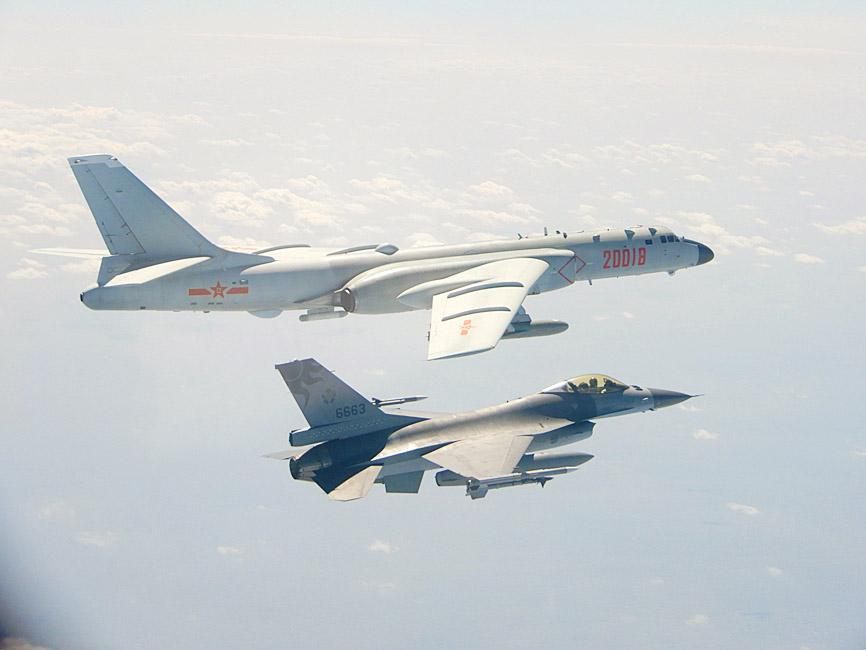China is stepping up its military preparedness to overtake Taiwan, Minister of Foreign Affairs Joseph Wu (吳釗燮) said yesterday, following a spike of Chinese drills near the nation.
Taiwan has said that China has stepped up threatening military activities near the nation in the past few months, while Beijing has not renounced the use of force to unify the nations.
“Looking [at] the long-term trend, China appears to be gradually stepping up its military preparedness, especially in air or on the waters near Taiwan,” Wu told reporters.

Photo courtesy of the Ministry of Defense via CNA
“What China is doing now is continuing to ramp up preparedness to solve the Taiwan issue,” he said. “The threat is on the rise.”
Beijing routinely says that such exercises are not unusual and are designed to show its determination to defend its sovereignty.
The Ministry of Defense last month reported eight incidents in which Chinese military planes entered Taiwan’s air defence identification zone and Taiwanese jets gave radio warnings to usher the intruders out of their airspace.
Wu said that such intrusions “happened almost every day” last month and were “much more frequent” than what the government had disclosed to the public.
China has also made several “simulated” military attacks on Taiwan, he said.
“These behaviors worry us,” Wu said, adding that Taiwan is deepening its security ties with allies, including the US which has no official diplomatic ties with the nation, but is its strongest international backer and main arms supplier.
Attacking Taiwan could be good way for the Chinese government to divert domestic pressure, Wu said, adding that China is struggling with a fast-slowing economy amid the COVID-19 pandemic and a wave of floods.

POSITIVE DEVELOPMENT: Japan and the US are expected to hold in-depth discussions on Taiwan-related issues during the meeting next month, Japanese sources said The holding of a Japan-US leaders’ meeting ahead of US President Donald Trump’s visit to China is positive news for Taiwan, former Japan-Taiwan Exchange Association representative Hiroyasu Izumi said yesterday. After the Liberal Democratic Party’s landslide victory in Japan’s House of Representatives election, Japanese Prime Minister Sanae Takaichi is scheduled to visit the US next month, where she is to meet with Trump ahead of the US president’s planned visit to China from March 31 to April 2 for a meeting with Chinese President Xi Jinping (習近平). Japan and the US are expected to hold in-depth discussions on Taiwan-related issues during the

‘LIKE-MINDED PARTNER’: Tako van Popta said it would be inappropriate to delay signing the deal with Taiwan because of China, adding he would promote the issue Canadian senators have stressed Taiwan’s importance for international trade and expressed enthusiasm for ensuring the Taiwan-Canada trade cooperation framework agreement is implemented this year. Representative to Canada Harry Tseng (曾厚仁) in an interview with the Central News Agency (CNA) said he was increasingly uneasy about Ottawa’s delays in signing the agreement, especially as Ottawa has warmed toward Beijing. There are “no negotiations left. Not only [is it] initialed, we have three versions of the text ready: English, French and Mandarin,” Tseng said. “That tells you how close we are to the final signature.” Tseng said that he hoped Canadian Prime Minister Mark Carney

President William Lai (賴清德) yesterday bestowed one of Taiwan’s highest honors on Saint Vincent and the Grenadines (SVG) Ambassador Andrea Clare Bowman in recognition of her contributions to bilateral ties. “By conferring the Order of Brilliant Star with Grand Cordon on Ambassador Bowman today, I want to sincerely thank her, on behalf of the Taiwanese people, for her outstanding contribution to deepening diplomatic ties between Taiwan and SVG,” Lai said at a ceremony held at the Presidential Office in Taipei. He noted that Bowman became SVG’s first ambassador to Taiwan in 2019 and

A man walks past elementary school artworks at the Taipei Lantern Festival in Ximen District yesterday, the first day of the event. The festival is to run from 5pm to 10pm through March 15.